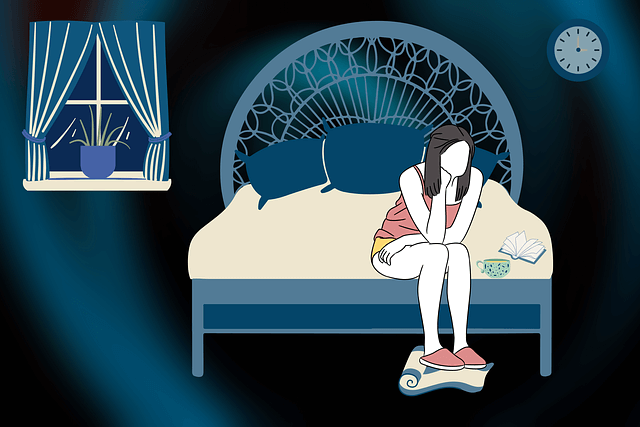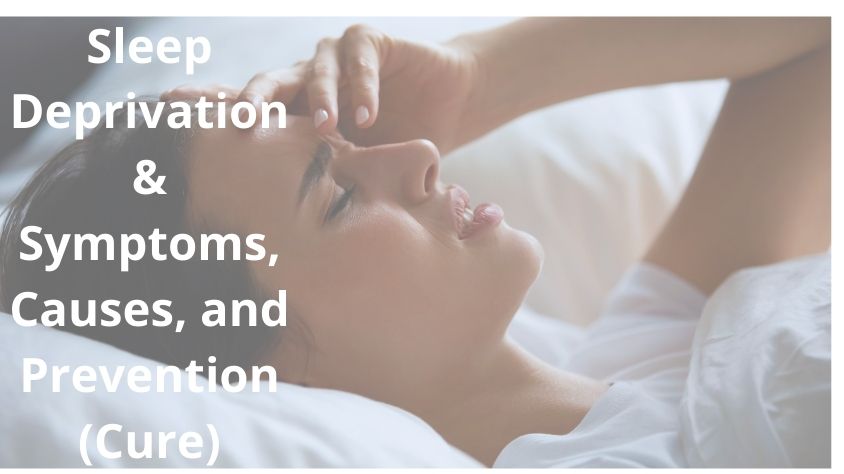After a night of little or no sleep, almost everyone has experienced a zombie-like feeling. We can feel tired during the day with delayed thinking, lack of energy, and an irritated mood even after just one night without proper sleep.
When you don’t get enough sleep, it’s called sleep deprivation. It is believed that one-third of American adults are affected, and the problem has only gotten worse in recent years.
Sleep deprivation has a direct impact on how we think and feel. While the short-term effects are more obvious, persistent sleep deprivation can increase the risk of physical and mental health problems in the long run.
It is critical to minimize sleep deprivation in order to avoid these issues.
Sleep Deprivation?

Sleep deprivation is described in sleep medicine by sleep duration, which is the total amount of time a person sleeps. In reality, though, being well-rested entails more than just sleeping for a certain number of hours. As a result, the phrases sleep deficiency or sleep insufficiency are more commonly used to describe conditions that interfere with a person’s ability to wake up refreshed by reducing the quantity and/or quality of sleep. As a result, sleep deprivation has a larger use. For example, a person who sleeps for eight hours but has multiple awakenings that disrupt their sleep may be getting insufficient sleep, despite the fact that their sleep length is legally meeting the prescribed amount.
This definition differs from common usage, where the word “sleep deprivation” can refer to bad sleep in general rather than just total sleep length. Even in the medical industry, studies may utilize varied technical definitions of sleep deprivation, with some defining it as less than seven hours of sleep and others defining it as less than six hours.
Types of Sleep Deprivation
Depending on the conditions, sleep loss and sleep insufficiency can be classified in a variety of ways.Acute sleep deprivation refers to a period of time, usually a few days or fewer, during which a person’s sleep time is significantly reduced.
The American Academy of Sleep Medicine defines chronic sleep deprivation, commonly known as insufficient sleep syndrome, as interrupted sleep that lasts three months or longer.
Chronic sleep deficiency, often known as insufficient sleep, refers to long-term sleep loss as well as poor sleep caused by sleep fragmentation or other interruptions.
Sleep Deprivation VS Insomnia?
While both insomnia and sleep deprivation are caused by a lack of sleep, many sleep experts distinguish between the two. Even when they have plenty of time to sleep, those with insomnia have problems sleeping. People who suffer from sleep deprivation, on the other hand, do not have enough time set aside for sleep as a result of their behavior or daily activities.
People who are sleep deprived due to a demanding work schedule frequently have no trouble sleeping longer on weekends to “catch up” on sleep. Insomniacs, on the other hand, struggle to sleep even when they have the opportunity.
Causes of Sleep Deprivation?
Poor sleep hygiene, lifestyle choices, work demands, sleep disorders, and other medical issues can all cause or contribute to sleep deprivation.
Voluntary actions that restrict available sleep time are frequently the cause of sleep deprivation. A person who stays up late to binge-watch a TV show, for example, may suffer from severe sleep deprivation. An irregular sleep cycle may make these decisions easier to make and feel less deliberate in the moment. Another common cause of sleep deprivation is work demands.
People who work several jobs or for long periods of time may not get adequate sleep. Shift workers who are required to work through the night may find it difficult to obtain the rest they require.
Other sleep disorders or medical issues might cause sleep deprivation. Sleep apnea, for example, is a respiratory problem that causes dozens of nocturnal awakenings. It can affect both the duration and quality of sleep. Other medical or mental health issues, such as pain or generalized anxiety disorder, might disrupt sleep quality and quantity.
The Symptoms of Sleep Deprivation?
Excessive daytime sleepiness and daytime impairments such as diminished focus, slower thinking, and mood changes are the most common indications and symptoms of sleep deprivation.
One of the telltale indicators of sleep deprivation is feeling unusually fatigued during the day. Excessive daytime drowsiness can make people feel drowsy and make it difficult to stay awake even when they need to. This can result in microsleeps5, in which a person falls asleep for a few seconds.
Inadequate sleep has a direct impact on how a person feels during the day. Some of these signs and symptoms include:
- Reduced attention span
- Worsened memory
- Poor or dangerous decision-making
- Lack of energy
- Mood changes, such as feelings of stress, worry, or agitation
The severity of a person’s sleep deprivation, as well as whether it is acute or chronic, can influence their symptoms. According to research, certain people are more likely to have symptoms following a lack of sleep, and this may be linked to their genetics7. Caffeine and other stimulants can mask the symptoms of sleep deprivation, so it’s crucial to keep track of how you feel when using them.
Best Selling Sleeping Aid
What Happens If You Don’t Get Enough Sleep?
Sleep loss and sleep deficit can have serious and far-reaching consequences.
Acute sleep deprivation increases the chances of making unintended mistakes and mishaps. Drowsy driving, which results in delayed reaction times and the possibility of microsleeps, can be fatal. Sleep deprived people are more likely to suffer in school and at work, as well as have mood swings that can impair personal relationships.
Chronic sleep deprivation has been linked to a variety of health issues. Sleep is essential for the proper functioning of nearly all of the body’s systems, thus chronic sleep deprivation has serious physical and mental health hazards:
- Cardiovascular disease: Sleep deprivation has been linked to a variety of cardiovascular issues, including high blood pressure, coronary heart disease, heart attack, and stroke, according to studies.
- Diabetes: Lack of sleep appears to impair the body’s capacity to manage blood sugar, raising the risk of metabolic diseases such as diabetes.
- Obesity: Research has found that when people don’t get enough sleep, they eat more calories and carbohydrates11, which is just one of multiple ways that poor sleep is linked to obesity and issues maintaining a healthy weight.
- Immunodeficiency: Sleep deprivation has been linked to a decline in immunological function, including a reduced ability to respond to immunizations.
- Hormonal imbalances: Sleep aids the body’s production and regulation of several hormones, thereby increasing sensitivity to hormonal issues in persons who are sleep deprived.
- Pain: People who don’t get enough sleep are more likely to acquire discomfort or feel like their pain is becoming worse. Pain can lead to more sleep disruptions, resulting in a vicious cycle of deteriorating pain and sleep.
- Mental health disorders: Sleep and mental health are inextricably linked, and poor sleep has been linked to diseases such as depression, anxiety, bipolar disorder.
Given these numerous and significant consequences of sleep deprivation, it’s no wonder that insufficient sleep has been linked to a higher overall risk of death as well as a lower quality of life in studies.
Also Read:
The Best Ways to Burn Fat in Weeks | Quickly
Prevention Cure and Treatment of Sleep Deprivation
Working with your doctor to find relief if you have continuous or worsening problems with insufficient sleep or daytime sleepiness is a smart starting step. Your doctor can assess your circumstances and make treatment recommendations that are most appropriate for you.
Sleep hygiene – your sleeping environment and daily practices — is a critical component of preventing and treating sleep deficiency in most circumstances. For persons who don’t get enough sleep, the sections below highlight several crucial sleep hygiene changes.
Don’t live with sleep deprivation cure it.
Many people don’t get enough sleep because they consider sleep deprivation to be normal. They consume caffeine or energy drinks, nap, or just try to “power through” rather than take the required measures to get sufficient sleep.
Your mattress and pillows should provide enough of support, and your bedding should keep you warm while keeping you cool. Make your bedroom as quiet and dark as possible to avoid any sleep disturbances.
Remove objects which will Disturb Sleep
None of these methods are long-term solutions to sleep deprivation. They may help you get through the day, but the long-term and short-term impacts of sleep deprivation will still be felt.
As a result, it’s critical to reject to accept a lack of sleep as usual and instead concentrate on sleeping more and having better quality sleep.
Do not Sacrifice your Sleep
When people choose to forego sleep in favor of work, pleasure, or other responsibilities, chronic inadequate sleep is common. To combat this, it’s important to make sleeping a top priority:
- Maintain a regular sleep schedule: Try to go to bed and wake up at the same time each day. Make sure to allocate time to obtain enough sleep while arranging those occasions. Once you’ve decided on a routine, stick to it, even on weekends. Your sleep pattern should be consistent to minimize nightly sleep variations.
- Establish limits in your work and social lives: It’s easy for the demands of your personal or professional life to eat into your designated sleep time, so it’s a good idea to establish boundaries so that you get the rest you need each night.
- Establish a nighttime routine: Prepare yourself each night by doing the same things, such as reading quietly or stretching, putting on pajamas, and brushing your teeth. A consistent bedtime routine might help you get into the appropriate mindset for a good night’s sleep.
Modify Your Bedroom Atmosphere
Make your bedroom setting conducive to rest and relaxation. If your sleep environment is attractive and meets your comfort needs, you’ll be less inclined to delay going to bed.
Avoiding items that might negatively impact your sleep:
- Electronic devices: Televisions, mobile phones, tablets, and laptops can keep your mind engaged, keeping you awake at night. The light emitted by these devices might potentially cause your circadian cycle to be disrupted. As a result, it’s advisable to refrain from using electronic gadgets for at least an hour before going to bed.
- Alcohol: Drinking alcohol, especially late at night, can interrupt your regular sleep cycle, lowering the overall quality and consistency of your sleep..
- Caffeine: Because caffeine acts as a stimulant and can stay in your system for several hours, it’s best to avoid it in the afternoon and evening.
- Naps: To avoid disrupting sleep at night, keep naps brief (30 minutes or less) and avoid taking them in the late afternoon or evening. If you’re having trouble sleeping, it’s better to skip naps entirely.
Make the Most of Every Moment of Every Day
Getting plenty of daylight throughout the day helps you maintain a healthy circadian rhythm, which keeps you awake during the day and drowsy at night. Regular physical activity will help you sleep better, so aim to get in at least some moderate exercise every day.
